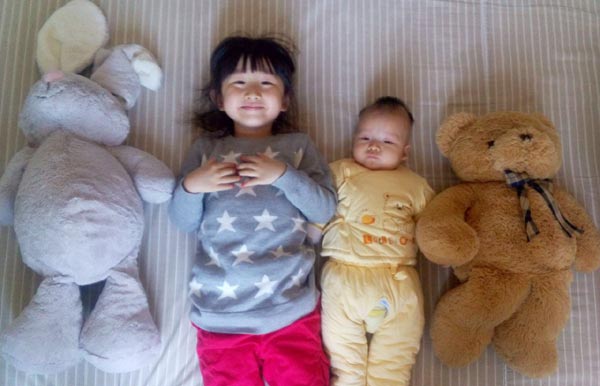China to allow two children for all couples
Updated: 2015-10-29 18:57
(Xinhua)
|
|||||||||||
 |
|
Li Shuchun, 4, and his 7-month-old brother Li Shuhan, live in Beijing with their parents who are among the 1.07 million out of 11 million eligible couples applied to have a second child by the end of last year. [Photo by Wang Nina/Provided to chinadaily.com.cn] |
Beijing - China will allow all couples to have two children, abandoning its decades-long one-child policy, the Communist Party of China (CPC) announced after a key meeting on Thursday.
The change of policy is intended to balance population development and address the challenge of an ageing population, according to a communique issued after the Fifth Plenary Session of the 18th Communist Party of China (CPC) Central Committee held from Monday to Thursday.
The proposal must be approved by the top legislature before it is enacted.
China's family planning policy was first introduced in the late 1970s to rein in the surging population by limiting most urban couples to one child and most rural couples to two children, if the first child born was a girl. The policy was later relaxed to say that any parents could have a second child if they were both only children.
The one-child policy was further loosened in November 2013 after the Third Plenary Session of the 18th CPC Central Committee, with its current form stipulating that couples are allowed to have two children if one of them is an only child.
Related reading:100 million couples would be eligible under a universal two-child policy
About 100 million Chinese couples will be eligible to have a second child when Beijing further relaxes the national one-child birth rule, a top Chinese population scientist estimated.
Yuan Xin, a scientist at Nankai University in Tianjin who sits on an expert panel of the National Health and Family Planning Commission, offered the projection in an interview with China Daily.
The central government initially eased the family planning policy in late 2013, allowing couples to have a second child in situations where one spouse was only child. As of June, only 1.5 million of the 11 million eligible couples had applied for second child.
The change will more highly impact rural families who are more interested than urbanites in having bigger families, Yuan said.
"The coming universal two-child policy would be much better received among the people than the previous policy relaxation," he said.
Yuan also urged the addition of more favorable social and economic policies to make it easier for couples to raise more children.
Official statistics show that China’s potential workforce, people ages 16 to 59, peaked around 2011, and has been in decline since then. At the same time, the number of working people has been declining as a proportion of the total population.
Last year, there were 916 million people between the ages of 16 and 59 in China, roughly 66 percent of the entire population. The proportion hit a peak of 74.5 percent in 2010, and has been falling ever since.
At the same time, the percentage of children to the total population has been dwindling, creating a dearth of future workers, said Mu Guangzong, a demographics expert at Peking University.
"The looming labor shortage will upset sustainable socioeconomic development of the country," Mu said.
To reverse the trend and fuel population growth, he recommended ending limits on family size.
China will need a new baby boom to counter aging, low fertility and labor shortages, Mu said.
Related Stories
100 million couples would be eligible under a universal two-child policy 2015-10-26 17:04
Report on two-child policy submitted to decision-makers 2015-10-16 15:16
Second child policy may be extended to all 2015-07-23 07:41
China has more newborns after easing 'one-child' policy 2015-07-10 17:06
China denies full implementation of 'two-child policy' 2015-04-10 19:16
Today's Top News
Two-child policy projected to add $12b in consumption
China to allow two children for all couples
China's central bank dismisses QE rumor
Chinese premier holds talks with German chancellor
Refugee crisis continues to create rift between pro-Europeans, Eurosceptics
Rescue operations continue in quake-stricken Afghan provinces
Dutch King receives Dutch rabbit with Chinese characteristics
Silk Road Fund to invest $100m in China International Capital Corp's IPO
Hot Topics
Lunar probe , China growth forecasts, Emission rules get tougher, China seen through 'colored lens', International board,
Editor's Picks

|

|

|

|

|

|






